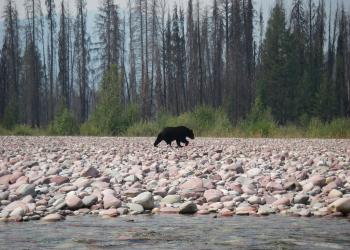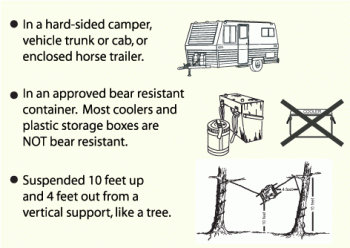Respect Wildlife
The Flathead National Forest is home to both black and grizzly bears. This page will teach you about important rules, regulations, and best practices for respecting wildlife.
Familiarize yourself with each of these topics to help prevent a situation where a bear is killed because it has become a nuisance or dangerous due to improper human actions.
Click on each tab to learn what you can do to safe safe in bear country:
Bears start emerging from dens in March, and some don't den until late fall or early winter. Mountain bikers, trail runners, and other recreationists take note and read our brochure on fast-paced recreation in bear country! When you are on the trails, expect bears to be present.
Moving quickly on a trail increases your chance of surprising a bear!
- Expect bears to be present
- Carry bear spray
- Make noise and slow down
- Avoid evening and early morning
- Avoid going alone
Many Montana national forests are home to the large and powerful grizzly bear. Where grizzly bears and humans occur together, conflicts may occasionally arise. The successful conservation and recovery of the grizzly bear involves habitat management and actions to minimize grizzly - human conflict potential.
Although aggression toward people and human injury is rare, incidents may occur during a surprise encounter, the protection of cubs, a defense of a food cache, or when bears have become accustomed to obtaining food associated with humans. When a bear becomes habituated to humans, displays aggression towards people or becomes conditioned to human food, the result is capture and relocation or removal from the population.
Familiarize yourself with these important tips in the chance you encounter a bear:
- Stop. Do not run. Get off your bike, keep your bike between you and the bear.
- If the bear charges: stand your ground, use your bear spray.
- If the bear makes physical contact: protect your head and neck, play dead, use your bear spray.
- For more information visit the Interagency Grizzly Bear Committee and read our information below.
Special Orders designed to minimize grizzly bear/human conflicts are in place across the region. Storage of food, garbage and other attractants is restricted during occupancy and use on all national forests within the Northern Continental Divide Ecosystem and all of Flathead, Kootenai, and Lolo National Forests.
These requirements are intended to help you avoid attracting grizzly bears into your camp or near to you while enjoying other non-camping forest activities. For your safety and for the recovery of the grizzly bear, your cooperation and compliance are needed.
Read the Regional Food Storage Order for more information.
Within the special order boundaries, as shown on the maps, you are required to store ALL food, including canned food and beverages, garbage, pet food and livestock feed, and any other attractants (such as food leftovers or bacon grease and toiletries such as soap and toothpaste) in a bear resistant manner. None of these materials shall be buried, discarded, or burned in an open campfire. Think of those who may use the site after you leave.
When you are not at your camp or picnic site, store all food products and attractants in the following bear resistant manner:
- In a hard-sided camper, vehicle trunk, or cab, or enclosed horse trailer.
- In an approved bear resistant container. Most coolers and plastic storage boxes are NOT bear resistant.
- Suspended 10-feet up and 4-feet out from a vertical support, like a tree.
For more, read our brochure Visitor's Guide to Storing Food and Attractants in Bear Country
“Printable brochures” Brochures – consider pinyon public viewing room
- Visitor's Guide to Storing Food & Attractants in Bear Country (pdf)
- Biking and Running in Bear Country (pdf)
- Montana FWP Brochure: Hunting in Bear Country (pdf)
Interagency Grizzly Bear Committee
Glacier National Park and other Federal Agency Bear Information
State of Montana
Hunting

There is a black bear hunting season in Montana. A bear identification program set up by the Montana Fish, Wildlife and Parks is intended to prevent mistaken identity killings of grizzly bears. Killing a grizzly bear in the lower 48 States is both a federal and state offense that can bring criminal and civil penalties of up to $50,000 and a year in jail.




